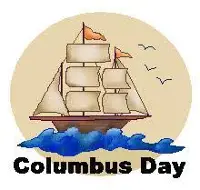Columbus Day
Christopher Columbus was an Italian explorer who commanded a voyage of exploration in the 15th Century that involved three ships sailing across the Atlantic Ocean and landing in the New World. Columbus made the journey across the Atlantic four times in all, but his first journey is perhaps his most famous. 
He landed on what he called San Salvador on Oct. 12, 1492. After spending five months exploring more islands in the Caribbean (and losing his flagship, the Santa Maria, Columbus sailed for home. He made three more journeys to the New World, at one point setting foot in what is now South America. He died in 1504, having never set foot in what is now North America. And yet, Columbus Day is in the United States a national holiday, marking the arrival of Columbus in the New World. A group of Italian-Americans conceived the day as a way to celebrate their heritage, by recognizing the historic achievement of an explorer from Italy (for Columbus was born in Genoa). The first such celebration took place in New York in 1866. Three years later, a similar celebration occurred in San Francisco. Some smaller observations occurred in years of centenary anniversaries (1792 and 1892, the latter the result of a proclamation by President Benjamin Harrison). 
The idea spread to other cities and states. An Italian-American named Angelo Noce, who lived in Denver and founded that state's first Italian-language newspaper, lobbied for his state to have a statewide celebration. Sen. Casimiro Barela, the state's first Latin-American state senator, took up the cause, and the state legislature passed the bill. In 1907, Gov. Jesse McDonald signed the bill into law. The U.S. Government 20 years later declared October 12 a national holiday across the country, thanks to efforts of another Italian-American, New York media magnate Generoso Pope, and to the Knights of Columbus, a nationwide fraternal organization named after the Italian explorer. Columbus Day is not always on the 12th of October. Since 1971, the holiday has occurred on the second Monday in October, in keeping with other federal holidays like Presidents' Day (the Monday between the birthday of Abraham Lincoln and the birthday of George Washington) and Memorial Day (the last Monday in May). Beginning in the late 20th Century, some cities and states began to move away from celebrations on Columbus Day because of controversies over the legacy of Columbus and other European explorers (who, along with innovations and "civilization" brought with them slavery, conquest, and many diseases for which Native Americans had no immunity). Some cities and states refuse to mark Columbus Day; some of those instead celebrate Indigenous Peoples Day. |
|
Social Studies for Kids
copyright 2002–2024
David White




